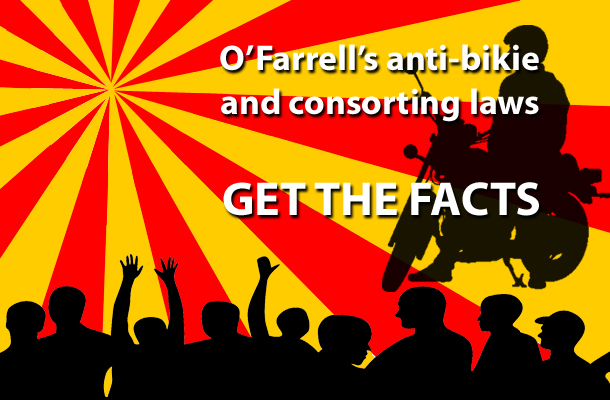Search
Democracy Links
Member's Off-site Blogs
goal bait .....

from the Drum …..
"You are the sort of man this act aims at," Magistrate Laidlaw told a 30-year-old Sydney man, George Harris, as he sentenced him to six months' hard labour.
The Vagrancy (Amendment) Act 1929 had been passed by the New South Wales Parliament just a year before. Laidlaw thought the act was fantastic - a "very desirable piece of legislation", he said in a separate case.
George Harris had violated the act by "habitually consorting with reputed criminals". He'd consorted with them at Central Station, and he'd consorted with them at Randwick racecourse. Not only had Harris consorted all over Sydney, Laidlaw hastened to point out, but he had been observed consorting "at various times of the night".
So what sort of man was George Harris? He had a police record more than a decade old, according to the Sydney Morning Herald. That record was spread across Australia and New Zealand.
Yet his offences were relatively minor - theft, vagrancy, and "being a suspected person". Harris may have been a bad sort, and may have hung around with other bad sorts. But in February 1930, the state of New South Wales imposed six months' hard labour upon him for mere association. No need to prove that he had stolen anything or assaulted anyone. His relationships were crime enough.
Consorting with convicted criminals was made unlawful in the midst of Sydney's moral panic over the 'razor gangs' - that era of crime luridly but forgettably depicted in Underbelly.
The tabloid newspapers had aggressively called for a crackdown on consorting in order to tackle the gangs. Introducing the anti-consorting laws, the colonial secretary claimed it was a necessary tool to deal with the many people "from other parts of the world" who were "engaged in an orgy of crime in this city".
But the crime of consorting was, in reality, a catch-all crime that gave police discretionary powers to pull up whoever they liked. The police had to give one warning and then that was it. As the University of New South Wales' Alex Steel has written, "once the police decided that a person was a criminal, they might proceed to arrest him or her for consorting on any convenient ground."
This unjust law gave police the power to criminalise what should be protected under freedom of association. It remained with its original strength for half a century, until the New South Wales government tightened up some of its excesses in 1979.
But consorting laws are back. The O'Farrell Government amended them earlier this year to give them more bite. They did so ostensibly to deal with bikie gangs and the recent drive-by shootings. Now even regular email with someone who was once found guilty of an indictable offence is now considered consorting.
Certainly, the amended law offers a few defences against a charge of consorting. For instance, it is legal to consort with someone if you are their lawyer or doctor. But that's not much consolation. The defences are extremely narrow, and the circumstances in which you could be found to have illegally consorted are extremely broad.
The NSW Young Lawyers society has pointed out consorting would even include football clubs where some members of the team have been convicted of assault. Police could disband a club with one warning. Any players that continued to fraternise with their team mates would face jail. Even if you assume police are at all times noble and dutiful, such powers are obviously - ludicrously - excessive.
The first person was convicted under the amended laws last week. Yet he was not a bikie, but a 21-year-old man the NSW police admits has no link with motorcycle gangs.
It was the same in the 1930s. The police found consorting laws useful to clear the streets of prostitution, but not so useful in clamping down on razor crime. Consorting laws are good for smoothing the wheels of prosecution - if you think the goal of a legal system is to maximise prosecutions. But its ability to prevent or punish serious criminal activity is limited.
Consorting laws are clearly unjust for those accused of consorting. But they are cruel for those who have been convicted and punished for a crime. A malicious police officer could eliminate a released criminal's freedom of association simply by issuing his friends with a warning.
When governments face law and order problems, the urge to "do something" must be overwhelming. The newspapers call for action. Talkback radio calls for crackdowns. Police call for more police power.
But police and prosecutors already have a long list of offences they can charge, and they have ample powers to do so. Nobody seriously believes motorcycle gangs are an unprecedented threat that a modern legal system is powerless against, yet for some reason everybody acts as if they are.
Benjamin Franklin famously said, "Those who can give up essential liberty to obtain a little temporary safety, deserve neither liberty nor safety."
Freedom of association - a freedom that extends even to those who have in the past been convicted of a crime - is one of those essential liberties.
Chris Berg is a Research Fellow with the Institute of Public Affairs. His new book is In Defence of Freedom of Speech: from Ancient Greece to Andrew Bolt. He tweets @chrisberg. View his full profile here.
- By John Richardson at 11 Jul 2012 - 3:47pm
- John Richardson's blog
- Login or register to post comments
Recent comments
46 min 57 sec ago
1 hour 45 min ago
1 hour 53 min ago
2 hours 1 min ago
4 hours 24 min ago
5 hours 46 min ago
7 hours 38 min ago
1 day 1 hour ago
1 day 3 hours ago
1 day 4 hours ago